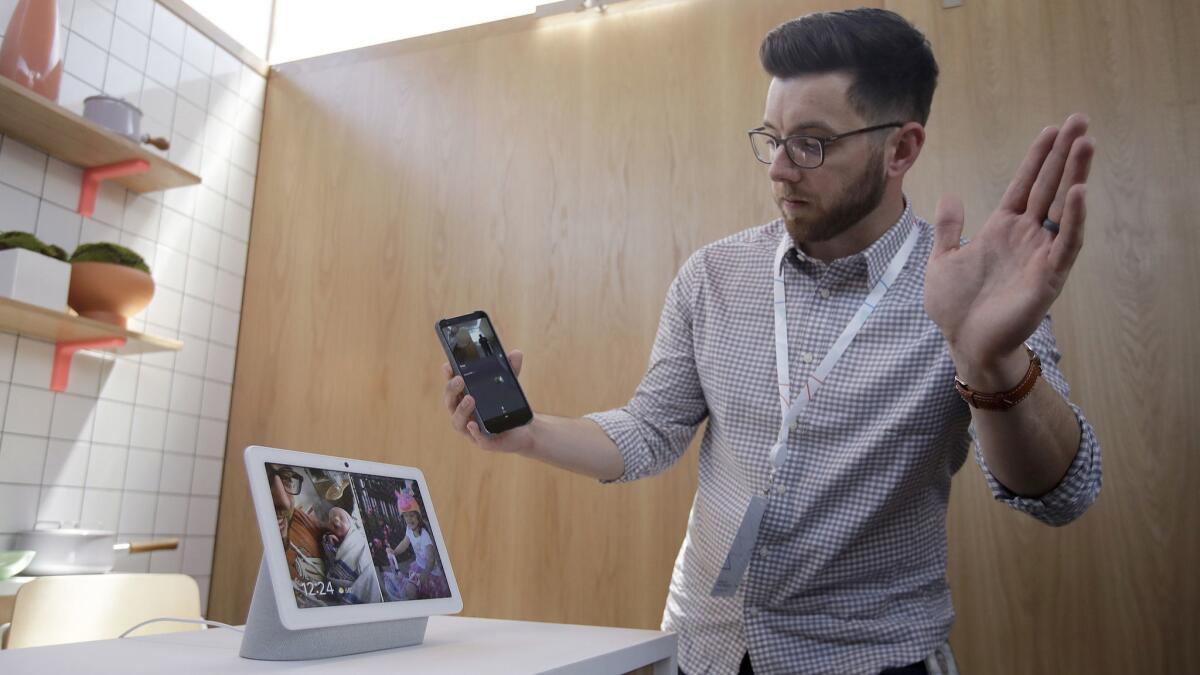Google facial recognition technology brings privacy debate into the home

- Share via
Google used its annual developer conference to unveil a “smart display” that uses facial recognition to offer users personalized information, including messages, calendar entries and recommendations of music and videos.
The technology is part of an upgraded smart speaker that features a larger screen, better sound and video calling. The internet giant showed off the $229 Nest Hub Max on Tuesday at its I/O developer conference in Mountain View, Calif.
For the record:
9:50 p.m. May 7, 2019A previous version of this article misspelled Google executive Rishi Chandra’s name as Richi.
It is part of a broader push to get the digital assistant into more homes. Google’s Assistant and its Home connected speakers came out after Amazon.com Inc.’s Alexa and Echo products.
But at a time of intense debate on Silicon Valley’s handling of privacy and personal information, the new device pushes the boundaries for the acceptance of facial recognition systems in the home.
While face-scanning cameras have become widespread in smartphones, the technology has been criticized for its application in public, particularly in surveillance and security cameras. But Google believes that convenience, alongside a new set of privacy commitments designed for “smart home” devices, will trump such concerns.
Thousands of Amazon workers listen to what you tell Alexa »
To allay potential privacy concerns, Google’s “Face Match” camera processes image recognition on each device, rather than sending the data to the cloud, as it does with some Nest security cameras.
It will not be turned on by default; customers will have to opt in to use the system. Once a person is recognized, they will have to tap the device’s touchscreen to show their personalized information.
The new smart display is one of the flagship product announcements at this year’s Google I/O, which also marks the start of a rebranding for the company’s home products, after its Nest subsidiary was absorbed into Google’s hardware division last year.
The “Google Nest” rebranding comes with a prompt for Nest customers to merge their user accounts with their Google profiles. “We want to make sure we are seamlessly integrating these devices,” said Rishi Chandra, vice president and general manager of Google’s Home and Nest products.
For some customers, merging Nest data could include years of information on a family’s comings and goings, home energy usage and security camera video recordings. Google has pledged not to use that information for advertising.
“That data will never be used for ads personalization,” Chandra said, before being corrected by a member of Google’s public relations team. “We can never say never,” he added hastily, “but the commitment we are making is, it is not being used.”
Google is hoping to recapture some of the trust it lost this year when it emerged that its Nest security hub included a secret microphone. Chandra conceded that it was a “mistake” not to inform customers when it went on sale.
In another change to how earlier devices, from Google Glass to Nest security cameras, have historically worked, the Home Max device will have an indicator light that always shows when it is capturing video — which users will not be able to switch off.
The lack of such an indicator light on the exterior of Google Glass was one factor that contributed to the privacy backlash that hobbled the futuristic eyewear before it was ever released to consumers.
Google is also putting forward a new set of “privacy commitments” that will apply when its “connected home” devices are connected to a Google account. That includes more transparency about the kinds of data that the devices’ sensors collect, how video and audio data are used, and an explanation of how the data can be deleted.
Google is not the first tech company to add cameras and screens to its “smart speakers.” Amazon’s Alexa-powered Echo Show launched in 2017, and last year Facebook unveiled Portal, a camera-toting device primarily aimed at videoconferencing. Mark Zuckerberg, Facebook’s chief executive, said last week that Portal was selling better than he had expected.
The Financial Times Limited 2019. All rights reserved. FT and Financial Times are trademarks of the Financial Times Ltd. Not to be redistributed, copied or modified in any way. Bloomberg contributed to this report.
More to Read
Inside the business of entertainment
The Wide Shot brings you news, analysis and insights on everything from streaming wars to production — and what it all means for the future.
You may occasionally receive promotional content from the Los Angeles Times.










